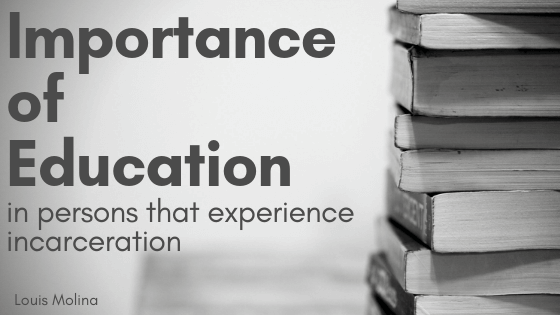For those facing charges while detained or sentenced in local jails, as well as persons incarcerated in prison, education can make a significant difference in the life they experience following their release. Understanding the relationship between incarceration and education can help emphasize the importance of providing more equalized opportunities for education in both the jail and prison systems; it is a vital social responsibility. For an incarcerated individual, receiving an education can redirect the course of their life beyond the adverse effects of poverty, familial incarceration, meaningless jobs and other mental and medical health issues that shorten a person’s lifespan.
Relationship between Education & Incarceration
In 2003, 65% of incarcerated American citizens lacked a high school diploma, and only 23% of these individuals had obtained a GED. Of these individuals, 41% had dropped out of high school prior to graduation. Learning disabilities & financial instability result in an incomplete educational experience, and because of these factors and the lack of education, incarceration is more common among those who are disadvantaged, impoverished, and have experienced educational neglect.
Dropping out of school has entirely negative effects; lacking the life skills and education necessary to participate and contribute to society, many individuals who do not complete high school or higher education often find themselves unemployed due to a lack of knowledge and credentials. Access to education is largely dependent on class as well as other factors, so those who are impoverished or financially struggling have fewer opportunities to acquire the skills necessary to survive.
The relationship between a lack of education and poverty is clear, and these factors directly relate to incarceration, as well. One 2015 prison study found that those who were imprisoned had a median income that was 40% lower than that of their non-incarcerated peers.
Reintegration & Rehabilitation
Because so many incarcerated individuals are negatively affected by poverty and a lack of education, providing education to those that are incarcerated is necessary for rehabilitation and lowering their chances of recidivating. Not only will the number of capable, qualified working adults increase following their release, but the crime rate will decrease. Providing education for incarcerated individuals allows them to gain skills and knowledge that they can use once they are released, and they will have a better chance of securing a job and participating in the economy.
Prioritizing education in the jail and prison systems will promote better long-term results, such as reduced crime, lower costs on mass incarceration, and a stronger economy. Allowing and encouraging incarcerated individuals to receive education and credentials like GEDs or other certificates can give them a better chance of finding employment following their release; given that securing and maintaining a job is necessary for an American citizen, having a steady income and better education reduces the likelihood of re-incarceration.
Education is a gift to our entire society, because it is the single factor that is proven to significantly reduce recidivism and improve outcomes from one generation to the next.

